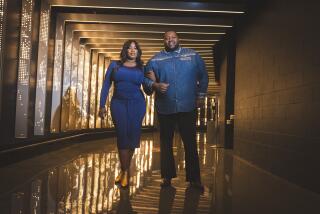War Is at Peace as Its Music Is Reborn : Pop Beat: There’s renewed interest in the superstar band of the ‘70s as it issues its 18th album on a new label.
- Share via
“We’re not that old . . . are we?” asks War’s Howard Scott, poking in mock horror at what looked to be a middle-aged spread around his middle.
Sitting in the Westside office of the group’s new label, he looks across at colleague Lonnie Jordan, who’s smirking at him. Not only does Jordan remind him that the group, a superstar outfit in the early ‘70s, was formed in the late ‘60s, but that the keyboard player is the son of an original member, drummer Harold Brown.
“Get those rocking chairs ready,” jokes Jordan, looking quite trim and fit at 45--two years younger than Scott.
“Playing this kind of music does keep you youthful,” explains Scott, pointing out that the band, which faded in the late ‘70s, has been playing clubs steadily all along. “You can’t be an old fogy and still play this upbeat, soulful music effectively. We’re still as funky as anybody out there.”
Anybody who doubts that boast should check out “Peace Sign,” the new War album on Avenue Records, which is headed by Jerry Goldstein, who co-managed the group in the glory days. It’s their strongest attempt since the early ‘80s--with RCA’s “Outlaw,” its last major label album--to recapture the superstar status. Back in their heyday, with hits like “Slippin’ Into Darkness,” “The Cisco Kid,” “Why Can’t We Be Friends?” and “The World Is a Ghetto,” this was one of the biggest bands in pop music.
It wasn’t the message of peace, love and brotherhood--hardly unusual for those days--that really distinguished the band. What made War unique was its sound--the prominent harmonica/tenor sax lines winding through a crackling fusion of R&B;, jazz, rock and Latin music--one of the most distinctive of that era.
Keyboardist-vocalist Jordan, guitarist-vocalist Scott and Brown--the only remaining original members--have returned to that old sound on this, War’s 18th album. They’d drifted away from it in the ‘80s, but in the last few years there’s been renewed interest in the band, largely thanks to rappers sampling their old hits--a trend that led to the 1992 collection “Rap Declares War.”
“It shows that our music is relevant again,” says Scott, a jovial, outgoing chatterbox who tends to overshadow the low-key Jordan. “We went through a period when it wasn’t relevant. Nobody wanted to know about War.”
In the late ‘70s, War was buried under a wave of disco music and never recovered. It kept changing labels--United Artists to MCA to RCA--and making albums but never could recapture the old magic. Since the early ‘80s, it has been largely a club band.
“We’d play anywhere where they’d book us,” Jordan recalls. “It wasn’t like playing big arenas, but we were making OK money. It wasn’t embarrassing, but it was a little frustrating at times. We’d been in the big time and had gotten used to it. But in a way it was fun playing clubs. The pressure was off in many ways, and it was a lot like it was when we started back in the old days.”
War originated in the late ‘60s in the Los Angeles area and rose to local prominence as a backup band for former Rams star Deacon Jones. But its career didn’t get rolling until the band broke away from Jones and recorded with British singer Eric Burdon. The band blossomed when it left Burdon in the early ‘70s.
“When I look back on those days I recall the guys in the band more than the music,” says Scott who, like Jordan, grew up in Compton. “That makes me feel good because there was nothing like the camaraderie and good times I had with those guys.”
It was largely a boisterous session until then, with Scott and Jordan spinning tales of the good old days, talking about former members B.B. Dickerson, who lives in San Bernardino, and Lee Oskar, who left the band in January. But then they slipped into a melancholy mood and started reminiscing about the two deceased members--Charles Miller, who was murdered in a 1979 robbery, and Papa Dee Allen, who died of an aneurysm onstage at a Northern California club in 1989.
“The last song we played with Papa Dee was ‘Gypsy Man,’ ” Scott recalls wistfully. “We haven’t played it since.”
More to Read
The biggest entertainment stories
Get our big stories about Hollywood, film, television, music, arts, culture and more right in your inbox as soon as they publish.
You may occasionally receive promotional content from the Los Angeles Times.










